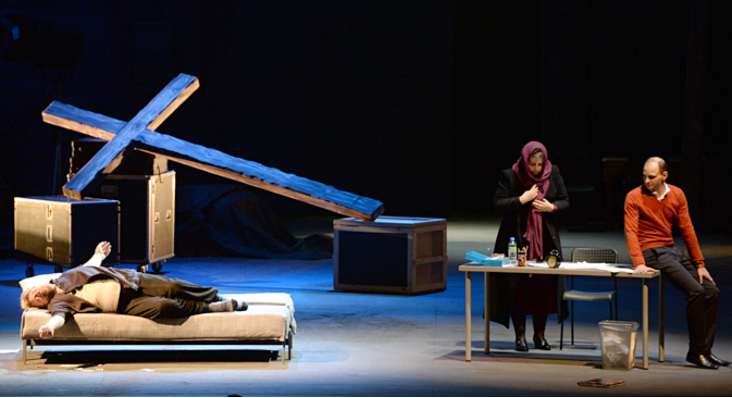Boris Mezdrich’s production of Wagner opera offended Orthodox activists.
Boris Mezdrich, the director of the Novosibirsk Opera and Ballet Theater, where there was a scandal over the staging of the Wagner opera Tannhäuser, has been fired, stated the Minister of Culture Vladimir Medinsky. The minister appointed the director general of St. Petersburg’s Mikhailovsky Theatre, Vladimir Kekhman, as the new director.
“I am glad that I did not give in to pressure and give up on the opera. Unfortunately, it was not possible to stand firm to the end victoriously. But I am thankful to all who supported us,” Mezdrich said in an interview with the Izvestia newspaper.
Regarding the dismissal, he found out on March 29, “when I met with the First Deputy Minister of Culture Vladimir Aristarkhov, who flew in from Moscow. He handed me the order terminating the contract and appointing Kekhman right there in the airport.”
The premiere of the Wagner opera, which was updated for a contemporary audience by director Timofei Kulyabin, took place in December 2014. According to the plot, the main protagonist Heinrich Tannhäuser presents to the public the erotic film Venus’s Grotto, which portrays young Jesus enjoying the carnal pleasures to be found in the grotto of the goddess of love. But a scandal erupts surrounding the film…
The same thing happened with Kulyabin’s production. A representative of the Russian Orthodox Church wrote a letter to the Prosecutor’s Office less than a month after the premiere, accusing the director of the opera and the theater director of intentionally desecrating religious symbols.
The Prosecutor’s Office subsequently opened an administrative case based on the public desecration of the image of Jesus Christ. In late March the court dismissed the administrative case for lack of evidence. The Prosecutor’s Office is contesting the court’s decision.
Commenting on the situation after Mezdrich’s dismissal, Magomedsalam Magomedov, deputy head of the presidential administration, said the opera had created “a confrontation between the secular and religious communities.”
“The Ministry of Culture had to intervene in the situation, publicize its position, and take appropriate action regarding personnel,” he said. In Magomedov’s opinion, the repertoire needs to be “looked at, at some stage” by the community of experts, especially in state theaters.
The new director of the theater in Novosibirsk, Vladimir Kekhman, said that the fate of Tannhäuser would be announced later. Earlier, at a Ministry of Culture board meeting, Kekhman noted that “as a believer, baptized person, Orthodox Christian, Jew, I am offended by this. This is a demonstration of inner wickedness in the style and spirit of the League of Militant Atheists.
“Frankly, I spoke with Mezdrich today, and he told me that he will not give up this performance and will take it to the end. I think he should resign and the performance must be removed from the repertoire.”
Leading Russian cultural figures, including the artistic director at the Chekov Moscow Art Theater Oleg Tabakov, the artistic director at the Theater of Nations Yevgeny Mironov, the head of the Academy of Artists Zurab Tsereteli, and the director general of the Bolshoi Theater Vladimir Urin, stood in support of the creators of the production and “the rights of the artist for freedom of creativity.”
This post originally appeared on Russia Beyond on March 31, 2015, and has been reposted with permission.
This post was written by the author in their personal capacity.The opinions expressed in this article are the author’s own and do not reflect the view of The Theatre Times, their staff or collaborators.
This post was written by RBTH .
The views expressed here belong to the author and do not necessarily reflect our views and opinions.


















